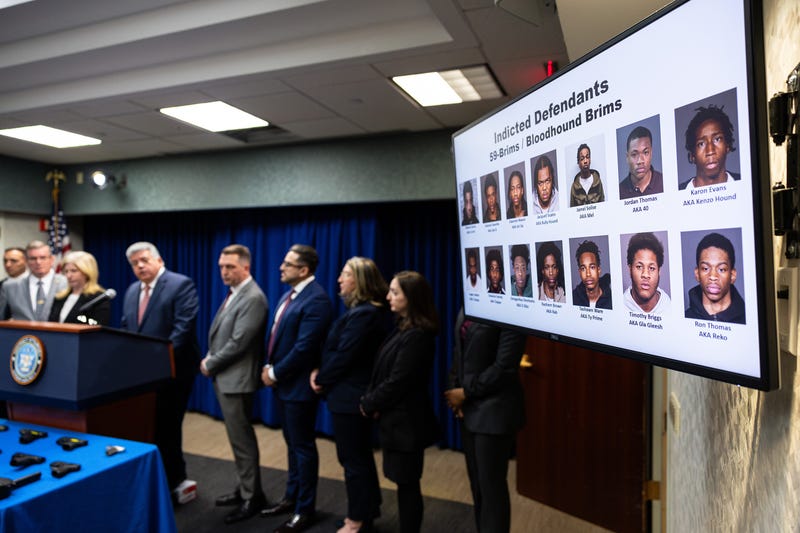
NEW YORK (1010 WINS) -- Civil rights advocates joined forces to sue New York City over the NYPD's so-called “gang database,” alleging it’s discriminatory to Black and Latino New Yorkers.
The federal class-action complaint—filed Wednesday by the Legal Defense Fund, The Legal Aid Society, The Bronx Defenders, LatinoJustice PRLDEF and the law firm Ballard Spahr—seeks to end the database, officially knowns as the Criminal Group Database.
The lawsuit alleges the NYPD’s practices and policies related to the database are in violation of the First, Fourth, and Fourteenth amendments to the U.S. Constitution, as well as state and local laws. The suit claims the database is used to "systematically target, surveil, and criminalize Black and Latino New Yorkers in violation of their constitutional rights."
“This database is stop-and-frisk 2.0,” said Bronx Defenders attorney Anne Venhuizen, referring to the NYPD practice of stopping and searching people on the street that was ruled unconstitutional in 2013.
“This is racial profiling,” Venhuizen said. “99% of the people on this database are Black or Latino.”
In a response to the lawsuit, the NYPD said the database is key to preventing the cycles of violence that arise among rival gangs in the city, noting a substantial portion of gun violence in the city is linked to gangs. Read the full NYPD statement below.
But civil rights attorneys say too many innocent New Yorkers are routinely harassed by police because they've ended up in the database.
The plaintiffs in the suit are three Black men who are lifelong New Yorkers. Two are fathers and one is an FDNY EMT. They said for over a decade they’ve been surveilled by the police even though they’re not and never were members of any gang.
According to figures obtained by 1010 WINS, the number of people in the database is about 13,200, which is a 27% drop from the 18,000 people in the database in 2019. Over the last two years, 682 people were added to the database, while 3,192 people were removed.
Kevin Jason, with Legal Defense Fund, alleged people are added to the database indiscriminately.
“Young men have been added for appearing in photos with family within their own housing complex. They’ve been added for writing ‘happy birthday’ to someone,” Jason said.
“We’ve heard from people that they’ve lost their jobs, that they’ve self-censored their speech,” Jason said.
Here is the NYPD’s full statement:
"Reducing gun violence is at the heart of the NYPD’s public safety mission, and a substantial portion of gun violence in New York City is attributable to gang or crew activity. The NYPD has a responsibility to use the tools at its disposal to solve those shootings and prevent more shootings. One of these tools is the Criminal Group Database, the Department’s central repository for intelligence regarding street-level gangs and crews.
As part of this effort, the Database provides crucial intelligence to NYPD investigators: it contains criminal group names, membership, associated incidents, geographic data, and inter-group rivalries and relationships. One of the many tragedies of gang-related shootings is that one shooting leads to a retaliatory shooting, which in turn to leads to another shooting. The key to preventing that cycle of violence is having accurate, immediate intelligence regarding gang membership, location, and rivalries, realizing when gang-violence is about to spiral, and intervening quickly to prevent it. If we know from the Database that a shooting victim is a gang member, the identities of rival gang members, and where those gangs are based, we can immediately deploy officers in a way that will help prevent retaliatory shootings. Our detectives work tirelessly to investigate these shootings and seek justice for the victims and their families. These successes are lives saved, often the lives of young people who would otherwise have become shooting victims.
While the information contained in the Database is a critical intelligence tool, a variety of protections ensure that the information in the Database is not misused. An individual’s inclusion in the Database is not a matter of public record. It does not appear in a person’s criminal history. The fact that someone is in the Database is not shared with employers, schools, landlords, or civil immigration authorities. The fact that an individual is included in the Database is not a ground for a stop or arrest and is not evidence in court. It is not a basis for charging decisions, bail determinations, or sentencing."
